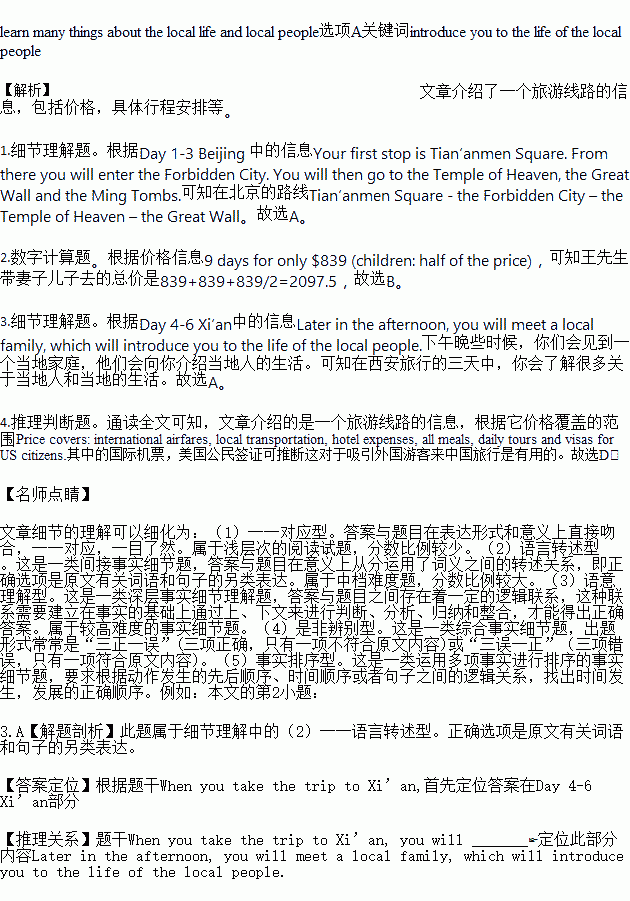题目内容
9 days for only $839 (children: half of the price)
Price covers: international airfares, local transportation, hotel expenses, all meals, daily tours and visas for US citizens.
Our address: No. 178, Zhongguancun Street, Haidian District, Beijing
Phone number: 010-62123855
Day 1-3 Beijing
Our guide will pick you up at Beijing airport and take you to the hotel near Wangfujing (Address: No. 72, Wangfujing Road, 010-86370248). Your first stop is Tian’anmen Square. From there you will enter the Forbidden City. You will then go to the Temple of Heaven, the Great Wall and the Ming Tombs. We will arrange a delicious meal in a delicate restaurant followed by a lively acrobatic show. You will finish the 3-day tour after having a glimpse at the Bird’s Nest.
Day 4-6 Xi’an
In the morning, you will take a flight to Xi’an. A visit to the great Terracotta Warriors and Horses Museum will start your 3-day tour. You will visit the Big Wild Goose Pagoda, the City Wall and the Great Mosque. Later in the afternoon, you will meet a local family, which will introduce you to the life of the local people. You will relax in the Red Star Hotel for 3 nights (Address: No. 165, Wenyi Road, Xi’an, 029-5670054).
Day 7-8 Shanghai
Our guide will pick you up at Pudong Airport and take you to the hotel for 2-night stay (Address: No. 24, Nanjing Road, 021-62458585). Our visit begins at the Shanghai Museum and the beautiful Yuyuan Garden. Afterwards, you will have some free time to walk along the Bund and buy souvenirs on Nanjing Road.
Day 9 Leave for Beijing
After breakfast at the hotel, you will take a taxi to the airport for Beijing flight. Our trip comes to an end at this time.
1.Which of the following is the correct route for the 3-day tour in Beijing?
A. Tian’anmen Square - the Forbidden City – the Temple of Heaven – the Great Wall
B. the Forbidden City – the Bird’s Nest - Tian’anmen Square – the Great Wall
C. Tian’anmen Square – the Temple of Heaven - the Forbidden City – the Great Wall
D. the Bird’s Nest - Tian’anmen Square – the Temple of Heaven – the Great Wall
2.If Mr. Wang plans to take the trip with his wife and son, they will have to pay _______
A. $839 B. $2097.5
C. $1258.5 D. $2517
3.When you take the trip to Xi’an, you will _______.
A. learn many things about the local life and local people
B. visit many surprising royal tombs, such as the Ming Tombs
C. watch lively acrobatic show after a delicious meal
D. have some free time to enjoy the beautiful Bund
4.The passage is useful in _______ .
A. encouraging Americans to apply for a visa
B. offering a free ticket booking service to tourists
C. helping foreigners to really understand China
D. attracting foreigners to go travelling in China

